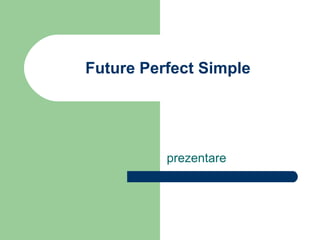
Future perfect-simple
- 1. Future Perfect Simple prezentare
- 2. schema Afirmativ: S + will + have + V(III)/ V-ed… (S’ll) Negativ: S + will + not + have + V(III)/ V-ed… (won’t) Interogativ: Will + S + have + V(III)/ V-ed…? Observatii: S = subiect; V = verb; “have” se pastreaza mereu, indiferent de ceea ce se transmite in propozitie; “S + will” se pot prescurta “S’ll”; “will + not “ se pot prescurta “won’t”. V(III)/ V-ed = verb la forma a treia (daca este neregulat) sau verb cu terminatie “-ed” daca este regulat;
- 3. Verbe regulate/ verbe neregulate Pentruexplicatia celor doua tipuri de verbe vezi prezentarea de la Past Simple.
- 4. utilizare Exprima o actiune viitoare incheiata inaintea unui moment viitor sau a unei alte actiuni viitoare (care se exprima cu Present Simple, chiar daca in lb.romana avem viitor!) Expresii : By (pana); By the time (pana la); Before (inainte) etc.
- 5. Exemple: Va termina de citit cartea pana Afirmativ: S + will + have + V(III)/ deseara. V-ed… She will have finished reading the book by tonight. “S + will” se pot prescurta “S’ll”; (she will = she’ll) Sau: Observatie: She’ll have finished reading the “a termina de citit” este o actiune book by tonight. viitoare incheiata ( Future Perfect) inaintea unui moment viitor “deseara”.
- 6. Exemple: Nu ne vom uita la film pana cand veti veni voi. Negativ: S + will + not + have + V(III)/ V-ed… We will not have watched the film by the time you “will + not “ se pot prescurta come. “won’t”: Sau: Observatie: “nu ne vom uita” este o We won’t have watched the film by the time you come. actiune viitoare incheiata ( Future Perfect) inaintea altei actiuni viitoare “veti veni” (Present Simple).
- 7. Exemple: Vei cheltui toti banii inainte Interogativ: Will + S + have + sa te intorci din vacanta? V(III)/ V-ed…? Observatie: Will you have spent all the money before you come “vei cheltui banii” este o back from your holiday? actiune viitoare incheiata ( Future Perfect) inaintea altei actiuni viitoare “sa te intorci” (Present Simple).
